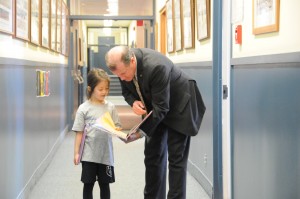 I thought a lot about civility a few weeks ago when I was in Toronto for an LCC Alumni reunion. On a Thursday morning, all the newspaper boxes in the city screamed with headlines about the same story: a mid-30’s man had recently verbally assaulted a female TV reporter at an MLS Soccer game. The man had launched a raunchy string of suggestive comments that were aggressive and pornographic in nature. The woman reporter stopped videoing her story and calmly confronted the man and his gaggle of moronic friends who quietly supported him by their inaction. Meanwhile, of course, a passerby videoed the whole incident and sent it to the local media. Within hours, the male aggressor was identified and was publicly “outed”. He was embarrassed by the utter stupidity of his actions, and very swiftly fired by Hydro One, the Ontario Power utility where he worked, for violating ethical norms and expectations of the company – even though his acts of stupidity did not occur while he was at work. His face appeared on the cover of every major Toronto newspaper that Thursday morning. His life and reputation were completely shattered.
I thought a lot about civility a few weeks ago when I was in Toronto for an LCC Alumni reunion. On a Thursday morning, all the newspaper boxes in the city screamed with headlines about the same story: a mid-30’s man had recently verbally assaulted a female TV reporter at an MLS Soccer game. The man had launched a raunchy string of suggestive comments that were aggressive and pornographic in nature. The woman reporter stopped videoing her story and calmly confronted the man and his gaggle of moronic friends who quietly supported him by their inaction. Meanwhile, of course, a passerby videoed the whole incident and sent it to the local media. Within hours, the male aggressor was identified and was publicly “outed”. He was embarrassed by the utter stupidity of his actions, and very swiftly fired by Hydro One, the Ontario Power utility where he worked, for violating ethical norms and expectations of the company – even though his acts of stupidity did not occur while he was at work. His face appeared on the cover of every major Toronto newspaper that Thursday morning. His life and reputation were completely shattered.
So what has happened to civility, accountability and empathy? The problem seems to be that people are prone to do silly or outrageous things when hiding in a group setting or behind the veil of the faceless Internet. Unfortunately, pressing send is impersonal; it never allows you to see the response of a recipient – and how a comment or image makes them feel as a person.
So an important reminder: whether part of a group activity or hiding behind the mask of the Internet, we are each still responsible for our own behaviour. No matter what, civility, respect, and accountability need to remain our foundations and never somehow disappear when you hide for a moment.
Being prepared to walk in the shoes of others helps us build a stronger sense of identity by learning from others and growing by being exposed to cultural or gender differences. That respect for difference helps build empathy and can lead to better judgment. Civility is the glue that is critical to the welfare of us all in society – no exceptions. I recently asked our high school students to talk about this issue together. I urged them to each to avoid being one of those unfortunate souls who helps chip away at civility. It’s neither funny nor cool; without defending civility we all lose. — Chris Shannon, Headmaster
